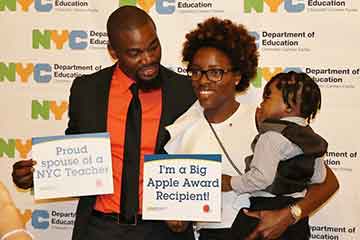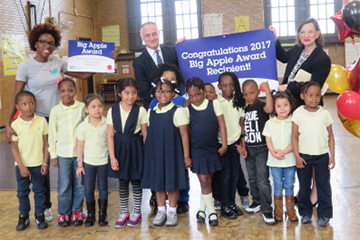Bulletin News

11/21/2017
Rose Graham-Newman ’07, M ’09 admits that she was challenged as a high school student growing up in an economically disadvantaged family in the Long Island community of Central Islip.
Newman, who was one of 12 children, had to take many remedial classes during elementary and middle school and attended summer school just to pass in the 10th grade.
“Not many children from my neighborhood grow up and get through high school much less college,” explained Newman. She credits SUNY Cortland for the transformation that has enabled her to become one of the best teachers in New York City, home to the nation’s largest public school system.
This summer, Newman was one of 19 educators honored with a Big Apple Award by the New York City Department of Education, and the first physical education teacher to receive the award in its five-year history.
Big Apple Award recipients represent a diversity of grade levels and subject areas from each of the five New York City boroughs. Newman was chosen from among 7,800 nominees and 1,000 finalists in a city that educates more than 1.1 million children each year.
“What really pushed me toward excellence was not just being a scholar at Cortland but also being a teacher coming out of Cortland,” said Newman, who is in her 10th year of teaching at Lorraine Hansberry Public School 118 in Queens, N.Y.
Now living on Long Island with her husband, Bevon Newman, and 2-year-old son, Isaac, Newman in her own life has surmounted obstacles similar to those now faced by her students.
“I was one of the first in my family to graduate from college,” she said. Athletics helped Newman earn the education she needed, but not in the way she expected.
Newman and her identical twin sister, Rosetta Graham-Nairne ’07, both were high school star basketball players. Newman’s best ticket to a college education seemed to be through collegiate basketball.
In 2002, her high school senior hoops performance brought her to the SUNY Cortland campus to compete for the Long Island team at the Empire State Games.
“That’s how I found out about SUNY Cortland,” she said. “I had such a great experience, that’s how I came to Cortland. I thought, ‘This is like sports heaven, physical education heaven. I want to come here.’
“The primary example that SUNY Cortland set for me was the tone when I got there,” she said. “I knew that Cortland was the P.E. school, number one. That’s where everyone went who wanted to be a physical education teacher. That was just the mindset, that I had to be not just good but great.”
Of course, coming to Cortland meant placing her own athletic career on the back burner and focusing on education. She did not play on Cortland’s Division III varsity women’s basketball team. But her decision certainly paid off.
“I ended up leaving my neighborhood and getting out,” she observed. “If it wasn’t for that, I would probably still be in my neighborhood ... Boy, Cortland and the Empire State Games is what actually got me out.”
She and Rosetta completed their degrees at Cortland together, having competed against one another nearly every step of the way. Today Rosetta teaches middle school physical education in Queens, N.Y.
“Who can get the highest score? Who can pass this class?” Newman said. “We would take courses from difficult teachers and say to one another, ‘I’m going to ace this class,’ ‘I’m going to pass this competency test.’ So that was really fun. It was like a competition instead of a class.”
And by the time the two crossed the platform to grasp their bachelor’s degree diplomas in physical education, both were encouraged that their older sister, Tricia Graham, had graduated one year earlier from SUNY Farmingdale.
Newman’s journey through SUNY Cortland was made possible by a prestigious four-year Cortland Urban Recruitment for Educators (C.U.R.E.) scholarship.
To say she made the most of her Cortland experience would be an understatement.
In 2007, she was honored as a National Association for Sport and Physical Education Major of the Year, an award that ultimately led to a SUNY Chancellor’s Award for Student Excellence, the highest student recognition given by the country’s largest comprehensive public system of higher education.
Inducted into Phi Kappa Phi, she earned many scholarships in her discipline as well as for student teaching and student leadership. She is listed in the 2007 Who’s Who Among Students in American Universities & Colleges.
Outside the classroom, Newman missed the basketball court. So, in 2004 she co-founded and ran the SUNY Cortland Women’s Club Basketball team, which continues today. As Most Valuable Player, Newman led the team to becoming regional champion in Boston, Mass., and placing fourth in the nation at Georgia Tech in 2007. She also served as vice president for the student club Women of Color and lent her voice to the SUNY Cortland Gospel Choir, traveling with the vocalists to Canada and England.
Newman said many of the courses she took at SUNY Cortland were centered around the concept of health-related fitness.
“They were trying to move P.E. from having that negative connotation of ‘gym’ where it’s kind of like ‘recess.’ It’s more like the learning became as important as the moving, because what is the sense of moving if you can’t link it to your health? Or not knowing what you’re doing or what aspect of fitness you are addressing?”
Among those were two emeritus faculty members, Associate Professor Michael Kniffen and Professor Eric Malmberg.
“Mike Kniffen embodied the type of teacher I wanted to be,” Newman said. “He taught with a passion and enthusiasm, and he was funny. He differentiated his instruction to meet the needs of students.
“He had it down to a science on how to capture the attention of students so that they can learn at their greatest potential,” she said. Newman continues to emulate Kniffen’s style of teaching.
“Malmberg, he was no joke,” she added. “He was a great professor, but he was tough. He played no games. I remember him saying, ‘If you think this is hard, you should change your major’ to people and he would give out change-your-major forms.”
She holds a special regard for the late English Department faculty member, Kathy Lattimore, who spent hours outside of class helping Newman improve her literacy and writing skills.
“She said, ‘Rose, this is not where you are supposed to be as a college student. It’s not your fault, but I’m going to help you to get where you need to be academically to be successful here at Cortland,’” Newman said. “She did all it took to make sure that I succeeded.”
As a C.U.R.E. scholar she was immediately assigned to assist at a high-needs school in Syracuse, N.Y.
“Those experiences exposed me at an early time in my education to the barriers of learning for students in urban education,” Newman said. “I was able to directly apply the experiences I had, in terms of dealing with the social, emotional and even socio-economic issues that occur in urban areas. As I continued on in my education as a physical educator, it made me stronger as a teacher because I was already aware of the barriers to education.”
After she had earned her B.S. in physical education (K-12), she remained at her alma mater and received an M.S. in teaching health education (K-12).
The transformation of Newman from a teenager who first visited the SUNY Cortland campus as an Empire State Games basketball standout into a dedicated wellness educator was completed in June when she captured her Big Apple Award.
“That excellence mark was set at Cortland, leading me toward the level of excellence that I’m at now,” said Newman.
“Some people say that perfection is an illusion. But I feel like Cortland makes it possible to be, if not perfect, close to it.”
In addition to continuing their outstanding work in the classroom, this year’s Big Apple Award educators will also serve as Big Apple Fellows during the 2017-18 school year. That entails meeting with New York City Department of Education Chancellor Carmen Farina monthly to improve policies and practices in the city’s education system.
“My physical education class is a place of moving and learning,” said Newman, who teaches pre-kindergarten through the fifth grade. Her overall goal is for students to “have fun while learning about health-related fitness, skills and character.”
She also sets specific goals that can be tracked during the year, and students are expected to spend at least 50 percent of class time engaged in moderate-to-vigorous physical activity and complete at least 1,000 steps during each lesson, as measured by the use of pedometers.
Students are empowered in Newman’s classroom, where she calls them her “friends.” They use self-monitoring behavior clip charts to hold themselves accountable. The Rising New York Road Runners program allows them to earn incentives for reaching physical education milestones. They even take on leadership roles such as managing equipment, motivating others, leading workouts and conducting peer and self-assessments. Newman also conducts an early morning fundamental fitness program titled Build Our Kids Success, which gets kids active before the school day begins.
Newman shares best practices and strategies with other district P.E. teachers through her Professional Learning Community.
Now she strives every day to change the lives of children the same way SUNY Cortland changed hers.
“My vision is that every student is pushed to their potential to maintain academic excellence and physical fitness for lifelong health,” she said.


